|
|
|
Sort Order |
|
|
|
Items / Page
|
|
|
|
|
|
|
| Srl | Item |
| 1 |
ID:
105153
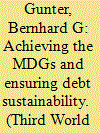

|
|
|
|
|
| Publication |
2011.
|
| Summary/Abstract |
This article analyses the growth and debt distress prospects of low-income countries (LICs) based on projections of the 2009 World Economic Outlook (WEO). It then reviews various debt sustainability concepts, including the appropriateness of the Bretton Woods institutions' current debt sustainability framework, and summarises the recent debt relief initiatives, including the Heavily Indebted Poor Country (HIPC) Initiative and the Multilateral Debt Relief Initiative (MDRI). It also examines the equity issues related to the recent debt relief initiatives and discusses various solutions suggested in the recent literature on how to ease the tension between making the necessary investments to achieve the MDGs while maintaining a sustainable debt.
|
|
|
|
|
|
|
|
|
|
|
|
|
|
|
|
| 2 |
ID:
105157
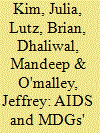

|
|
|
|
|
| Publication |
2011.
|
| Summary/Abstract |
Progress towards the Millennium Development Goals (MDGs) has been mixed, and many observers have noted the tendency for development actors to address individual MDGs largely in isolation from one another. This in turn has resulted in missed opportunities to catalyse greater interdisciplinary collaboration and innovation towards MDG achievement. The term 'AIDS and MDGs' is gaining currency as an approach that aims to explore, strengthen and leverage the links between AIDS and other health and development issues. Drawing from academic literature and from MDG country reports, this article sets out three important pillars to an AIDS and MDGs approach: 1) understanding how AIDS and the other MDGs affect one another; 2) documenting and exchanging lessons learned across MDGs; and 3) creating cross- MDG synergy. We propose broader policy level implications for this approach and how UNDP and other partners can take this agenda forward. Because the MDGs explicitly locate HIV within a broader international commitment to human development targets, they provide a critical platform for development partners to galvanise resources, political will and momentum behind a broader, systematic and structural approach to HIV, health and development.
|
|
|
|
|
|
|
|
|
|
|
|
|
|
|
|
| 3 |
ID:
105156


|
|
|
|
|
| Publication |
2011.
|
| Summary/Abstract |
This article reviews proposals regarding the recent food crisis in the context of a broader, threshold debate on the future of agriculture and food security. While the MDGs have focused on eradicating extreme poverty and hunger, the food crisis pushed the hungry over the one billion mark. There is thus a renewed focus on agricultural development, which pivots on the salience of industrial agriculture (as a supply source) in addressing food security. The World Bank's new 'agriculture for development' initiative seeks to improve small-farmer productivity with new inputs, and their incorporation into global markets via value-chains originating in industrial agriculture. An alternative claim, originating in 'food sovereignty' politics, demanding small-farmer rights to develop bio-regionally specific agro-ecological methods and provision for local, rather than global, markets, resonates in the IAASTD report, which implies agribusiness as usual ''is no longer an option'. The basic divide is over whether agriculture is a servant of economic growth, or should be developed as a foundational source of social and ecological sustainability. We review and compare these different paradigmatic approaches to food security, and their political and ecological implications.
|
|
|
|
|
|
|
|
|
|
|
|
|
|
|
|
| 4 |
ID:
105158


|
|
|
|
|
| Publication |
2011.
|
| Summary/Abstract |
The word' partnership' is pervasive within debates about participatory global governance and the idea of partnership acts as an underwriting principle within both the Millennium Development Goals (MDGs) and the Paris Declaration. However, there remains general ambiguity about the meaning of the idea of partnership and how its conceptualisation is meant to normatively guide a more co-ordinated move from theory to practice. Indeed, the idea of partnership remains an impoverished theoretical and practical appeal, which is under-defined, poorly scrutinised and unconvincingly utilised as a normative tool in applied practice. This article will provide a more theoretical examination of what an appeal to ideas of partnership means and explore what a normative commitment to a robust conceptualisation of partnership might look like within the MDGs. To do so, it will examine the underwriting normative language of partnership as it is found within the MDGs, theoretically explore the principles inherent within this normative language, and locate present gaps within the MDGs between its normative theory and applied practice. By doing so, it will be possible to outline some additional principles and commitments that are normatively required to satisfy the underwriting spirit of the MDGs in order to bring them in line with said spirit's own normative values.
|
|
|
|
|
|
|
|
|
|
|
|
|
|
|
|
| 5 |
ID:
105151
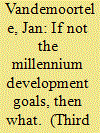

|
|
|
|
|
| Publication |
2011.
|
| Summary/Abstract |
Even if the MDGs are achieved, the world will still face unacceptably high levels of hunger, morbidity, mortality and illiteracy beyond 2015. Global targets can be drivers of change. The debate about the post-2015 framework should not be about the usefulness of global targets but about their improved architecture and enhanced relevance. After reviewing the good, the bad and the ugly that have happened since the MDGs were created, this article discusses several challenges and pitfalls in the process of defining the post-2015 framework, including the need to formulate the MDGs more clearly as global targets, to maintain their measurability, to focus on ends, to embed equality of opportunity, to include interim targets, and to conduct global summitry differently so as to make it better fit for purpose. A Peer & Partner Group is proposed as the global custodian of the MDGs in order to reduce undue donorship.
|
|
|
|
|
|
|
|
|
|
|
|
|
|
|
|
| 6 |
ID:
105154
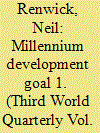

|
|
|
|
|
| Publication |
2011.
|
| Summary/Abstract |
This article considers three questions: 1) what progress has been made in achieving MDG1 targets?; 2) what challenges remain?; and 3) what more could and should be done? To examine these questions, the article assesses the progress of Southeast Asia in seeking to achieve MDG1. It argues that the region is 'on track' to achieve MDG 1 targets, although significant challenges such as inequality remain. Economic growth, significant structural change and incorporation into global value chains have contributed to MDG progress. However, this is a double-edged sword as exposure to global economic turbulence can increase. The longer-term reduction of poverty, inequality and social exclusion is a question of empowerment of local producers within value chains-a shift in economic power and control through pro-poor strategies strong enough to effect substantive structural change. The article outlines key concepts; identifies the main characteristics of Southeast Asian poverty; outlines what more needs to be done; and concludes by reprising the article's findings and weighing the prospects for 2010-15 and beyond.
|
|
|
|
|
|
|
|
|
|
|
|
|
|
|
|
| 7 |
ID:
105152
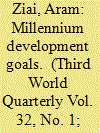

|
|
|
|
|
| Publication |
2011.
|
| Summary/Abstract |
The Millennium Development Goals (MDGs) constitute a normative consensus in the development community at the beginning of the 21st century. This article examines that consensus from the perspective of post-structuralist discourse analysis by situating it in its historical context, comparing the Millennium Declaration with the UN International Development Strategy of 1970. The article illustrates the depoliticising bias of the main MDG documents and interprets the shift in favour of market-oriented solutions and non-antagonistic conceptions of global community as the principal manifestations of a significant shift in development discourse.
|
|
|
|
|
|
|
|
|
|
|
|
|
|
|
|
| 8 |
ID:
105159
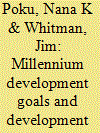

|
|
|
|
|
| Publication |
2011.
|
| Summary/Abstract |
Five years from the end of the 15-year span of the Millennium Development Goals (MDGs) it is already plain that progress has been patchy and that the larger goals will not be met. The scale and profile of the MDGs will make them subject to eventual success or failure judgments and 'lessons learned' analyses, but the evidence of the past decade and current trajectories are sufficient to reveal our conceptual and operational shortcomings and the kinds of reorientation needed to ensure that the last five years of the MDGs will exhibit positive momentum rather than winding-down inertia. Such reorientations would include prioritising actors over systems; disaggregated targets over global benchmarks; qualitative aspects of complex forms of human relatedness over technical 'solutions'; and the painstaking work of developing country enablement over quick outcome indicators, not least for the purpose of sustainability. Thinking and planning beyond 2015 must be made integral to the last five years of the MDGs, for normative as well as practical reasons.
|
|
|
|
|
|
|
|
|
|
|
|
|
|
|
|
| 9 |
ID:
092982
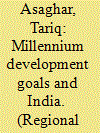

|
|
|
| 10 |
ID:
058841
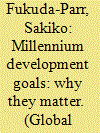

|
|
|
|
|
| Publication |
Oct-Dec 2004.
|
|
|
|
|
|
|
|
|
|
|
|
|
|
|
|
| 11 |
ID:
105155
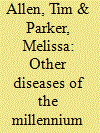

|
|
|
|
|
| Publication |
2011.
|
| Summary/Abstract |
The sixth MDG aims 'to combat HIV/AIDS, TB, malaria and other diseases'. The residual category of 'other diseases' has become the focus of intense interest, partly because it has provided an opportunity to increase resources for the control of the mostly parasitic 'neglected tropical diseases' (NTDs). Intense lobbying has secured large amounts of funding from donors, as well as generous donations of medicines from the major drug companies. A massive programme is now underway to treat the parasites of the poor in Africa via integrated vertical interventions of mass drug administration in endemic areas. The approach has been hailed as remarkably effective, with claims that there is now a real prospect of complete control and, for some NTDs, even elimination. However, a closer look at evaluation and research data reveals that much less is known about what is being achieved than is suggested. Competition between implementing organisations is leading to potentially counterproductive exaggerations about treatment coverage. Detailed local-level research in Uganda and Tanzania shows that actual rates of drug take-up among target populations are often lower than is necessary to effectively control the diseases, and that methods of drug distribution may even lead to active resistance to treatment. If current trends are not corrected, declining rates of NTD infection will not be sustained. Much more rigorous and effective monitoring is essential.
|
|
|
|
|
|
|
|
|
|
|
|
|
|
|
|
|
|
|
|
|